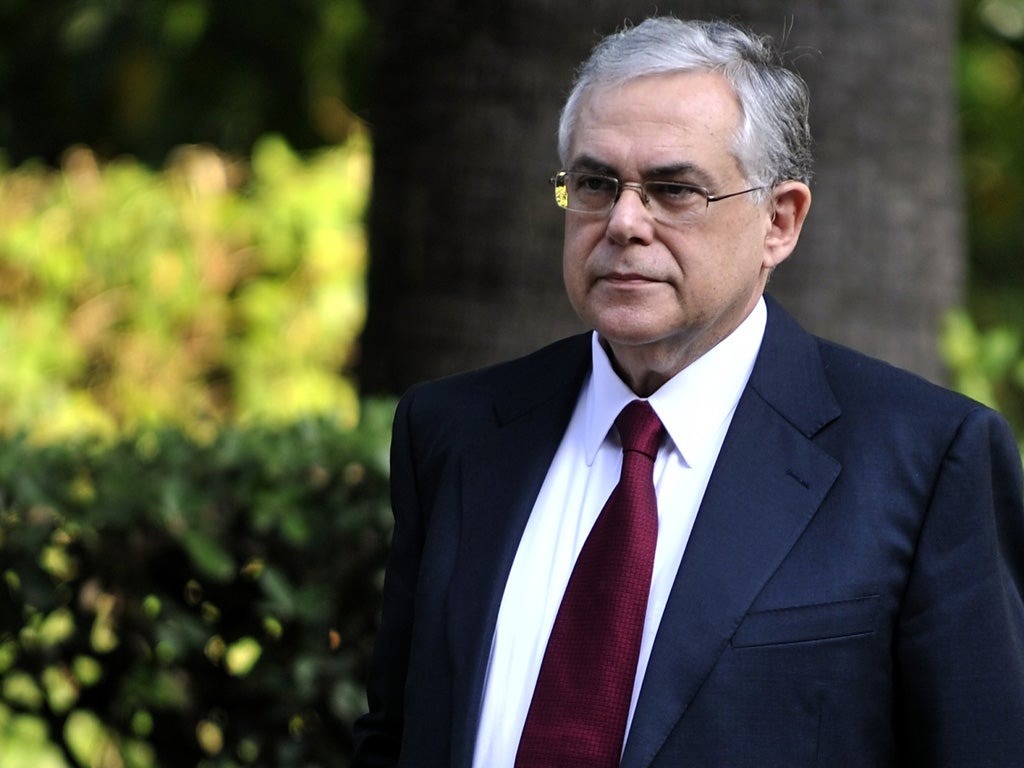Greece: New PM faces challenge of restoring credibility to nation's politics
Mr Papademos must agree a cabinet with the squabbling parties backing the unity government

Lucas Papademos has begun the task of restoring Greece's lost credibility and maintaining its place in the eurozone after being announced as the new prime minister. The former vice-president of the European Central Bank was unveiled yesterday as head of a crisis coalition whose formation has shown the country's politics to be as close to bankruptcy as its exchequer.
The 64 year-old economist said the country was at a “crossroads” and “facing huge problems” despite previous efforts: "The path will not be easy but I am convinced the problems will be resolved faster and at a smaller cost if there is unity, understanding and prudence."
Mr Papademos, who as governor of the Bank of Greece oversaw the country's entry into the single currency is now tasked with calming Athens' fevered political scene and will need all the political capital he earned during an eight-year spell at the ECB.
He must now agree a cabinet with the squabbling parties backing the unity government and implement the terms of the debt deal negotiated with the so-called Troika – the European Commission, the European Central Bank and the International Monetary Fund, last month. Today's announcement of the ministerial line up will be watched for signs that both socialist Pasok and conservative New Democracy are fully behind the painful reforms.
“People don't realise how bad the situation is,” warned Athens-based political analyst Philip Ammerman. “The challenge will be implementation not passage of the measures.” The new government faces a public sector wage bill of €4bn in December, with some civil servants unpaid for up to four months already, as well as €6.5bn of loans that need refinancing. The final instalment of the country's first bailout amounts to only €8bn. Mr Papademos must choose between a hard default, or leaving wages unpaid over Christmas unless he can find additional assistance.
“He needs to buy short term peace at home so unless there's very creative fudge there will be a hard default,” said Mr Ammerman, The new focus on Italy has persuaded some in leaders in Athens that Greece's eurozone partners have been distracted and will soften their demands.
The international rescue package will see €130bn in new loans and a 50 per cent haircut on existing debt, worth €100bn, in return for austerity measures including public sector pay cuts, job losses, pension cuts and privatisations.
Mr Papademos will have to deal with the leaders of the two main parties, his predecessor George Papandreou and conservative head Antonis Samaras, but denied that any pre-nuptial agreement had been made with them over how the coalition would function.
A long-time member of Pasok who owes much of his career to Mr Papandreou's father, Andreas, the new prime minister is still seen in Athens and Brussels as his own man.
“He played a major role at the 17-nation ECB, which managed to establish itself as the only European institution never accused of national bias,” said a former colleague of Mr Papademos. “If he can make a success of this job he will become an historic figure with streets named after him.”
Greece's political elite, who are toxically unpopular thanks to their handling of the economic crisis, are well aware of the threat posed by an independent figure and have given the caretaker government a four month lifespan to limit that danger.
The public response to an unelected coalition whose agenda contains more unpopular austerity measures will become clearer in three weeks when the draft budget for 2012 appears.
The Greek Communist Party refused to join the unity talks and called on its supporters to “topple” the government. Meanwhile the head of the union of power workers warned of “war” and threatened to occupy power stations if more cuts or a sell-off were attempted.
Figures released yesterday showed Greece's jobless rate had climbed to 18.4 per cent, a year on year leap of over 6 per cent. Unemployment among the 15-24 age group is now 43 per cent.
Subscribe to Independent Premium to bookmark this article
Want to bookmark your favourite articles and stories to read or reference later? Start your Independent Premium subscription today.

Join our commenting forum
Join thought-provoking conversations, follow other Independent readers and see their replies